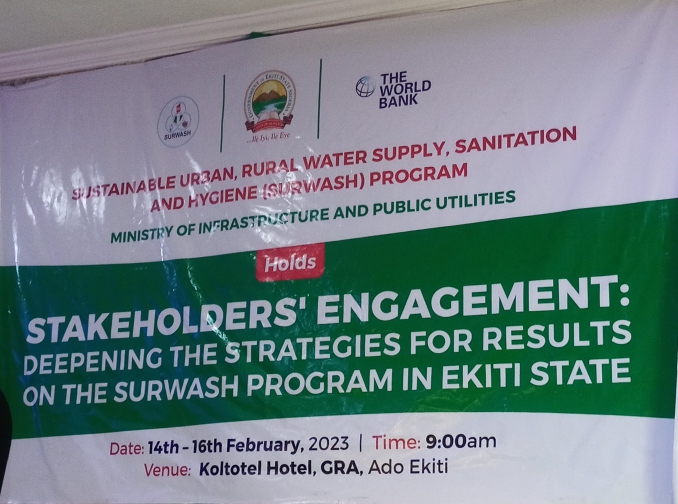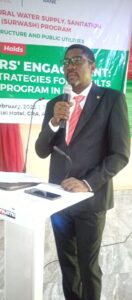
Ninety per cent of residents of Ekiti State lack access to safely managed drinking water, out of which 73% drink water contaminated with E-Coli from source or at household levels, and 41% of people of the state still defecate openly.
In figures, about 2.1m people in Ekiti State are without safely managed water, 1.7m drinking E-Coli contaminated water, and 977,526 people defecating in open places, based on the 2006 National Population figures which estimated the State’s population at 2,384,212 people. The figures would be higher with the population growth rates between 2006 and 2023.
Reeling out this facts and figures at the opening of a three day stakeholders engagement workshop on the Sustainable Urban Rural Water, Sanitation, and Hygiene (SURWASH) programme in Ado Ekiti, Ekiti State capital, today, the Permanent Secretary, Ministry of Infrastructure and Public Utilities (MIPU), Engineer Olumide Ajayi, said five previously financed external interventions in the Ekiti State Water, Sanitation, and Hygiene (WASH) sector, did not significantly improve access to safe Water, Sanitation, and Hygiene (WASH) in the State.
These interventions are:
- National Urban Water Reform Programme financed by the World Bank between 2014 and 2020.
- Water Supply and Sanitation Sector Reform Programme Phase Three implemented in small towns by the European Union between 2014 and 2020.
- Water Supply and Sanitation Sector Reform Programme Phase Three implemented in rural areas by the European Union between 2014 and 2020.
- Rural WASH programmes implemented by WaterAid in 2020
- Ongoing Partnership for Expanded Water Supply, Sanitation, and Hygiene (PEWASH) being implemented by the Federal Government of Nigeria.
Engineer Ajayi, however, said several lessons were learnt from these previous interventions:
- Need for robust Stakeholders engagement
- Gender mainstreaming and the needs of people with disabilities should be considered when designing WASH facilities
- Monitoring and Evaluation is critical
- Village Level Operation and maintenance activities enhances system functionality
- Policy formulation for the sustainability of the system is essential
- Awareness campaign for behavioural change in WASH (Open Defecation Free ODF, Security and Protection of facilities) should be undertaken
- Enforcement of the WASH Law is an approach that works
- Sector Wide Approach (SWAp) for WASH is the best practice
- Knowledge management and need for capacity building is a requirement for sustainable WASH
Themed: Deepening the Strategies for Results on the SURWASH Program in Ekiti State, the workshop featured:
- An overview and achievements of the SURWASH Programme in Ekiti State.
- Presentation on the expectations, results area and disbursement linked indicators on the program (P4R Framework and Disbursement).
- How SURWASH will address service gaps in the WASH Sector.
- WASH in Schools and Health Care Facilities (HCFs) under SURWASH
- SURWASH Environmental and Social Safeguards. Water Supply and Sanitation Sector Reform Programme Phase Three implemented in small towns by the European Union between 2014 and 2020.
The Ado Ekiti event was attended by:
- Mr Bunmi Adelugba (Speaker- Ekiti State House of Assembly)
- Mr James Owolabi (Permanent Secretary, General Administration Department, Office of Head of Service)
- Mr Ojo Mathins (Chairman, Ekiti State House of Assembly Committee on Utilities
- Prof Mobolaji Aluko (Special Adviser to State Governor, Ministry of Infrastructure and Public Utilities-MIPU)
- Mr. Segun Fakuade (Special Adviser to the State Governor on Governance, Reform, and Innovation)
- Dr Bimpe Aderiye (Special Adviser to the State Governor on Education)
- Permanent Secretaries: Engr Adeola Johnson (Housing and Urban Development), Engr Odesanmi (Agriculture and Food Security) and Alhaji Ganiyu (Office of Establishment and Service matters)
SURWASH is a six year programme designed to support the implementation of the National Action Plan (NAP) for the Revitalization of Nigeria’s WASH sector in seven states- Delta, Ekiti, Gombe, Imo, Kaduna, Katsina, Plateau; and the Federal level.

It focuses not only on improving access to Water Supply, Sanitation and Hygiene (WASH) services in selected states, and establishing the policies, regulations, procedures, institutional frameworks, and supply chain and infrastructure management models required to improve sector performance over the long-term along critical dimensions including governance, technology and technical competency, ownership, private sector participation, Monitoring and Evaluation(M&E), access to finance, sustainability, inclusion, and resilience. SURWASH is being implemented in selected rural areas and small towns of Nigeria.
SURWASH is financed by a $700m World Bank loan and $175m government contributions. The loan agreement was signed on September 17, 2022, and implementation has commenced. It takes a hybrid approach to financing by utilizing:
- A US$640 million Program-for-Results (PforR) component for states; and
- A US$60 million Technical Assistance (TA) component for states and selected Federal institutions, which will be implemented as an Investment Programme Financing (IPF) to address critical institutional development and capacity gaps within implementing institutions.
Leave a Reply